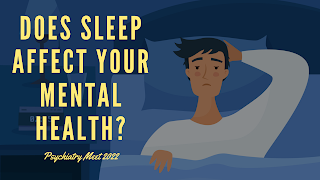Does Sleep affect your Mental Health?

It's no secret that getting enough sleep is essential for optimal physical and mental health . In the short term, sleep deprivation might make you irritated and weary, but it can also have major long-term health repercussions. Sleep deprivation has been related to a range of negative health outcomes, including heart disease, type 2 diabetes, and depression. Sleep disorders can be caused by psychiatric ailments, and sleep abnormalities can increase the symptoms of many mental illnesses, including depression, anxiety, and bipolar disorder. During sleep, brain activity fluctuates, increasing and decreasing across the many sleep stages that make up the sleep cycle. Overall brain activity slows during NREM (non-rapid eye movement) sleep, but there are short bursts of energy. Because brain activity increases fast during REM sleep, this stage is connected with more intense dreaming. The brain's processing of emotional information is aided by enough sleep, particularly REM sleep...